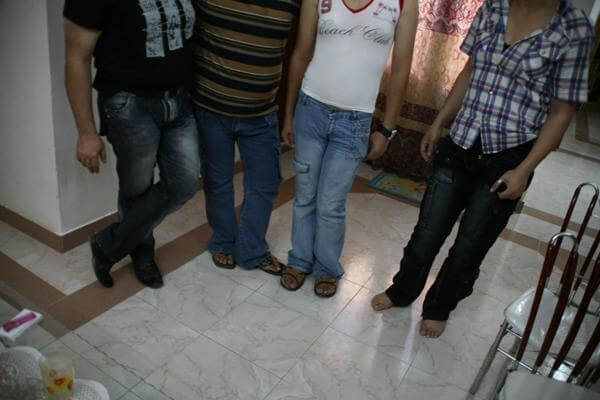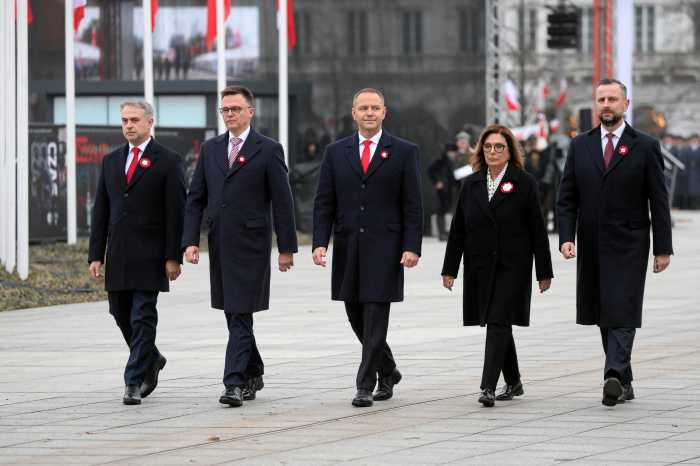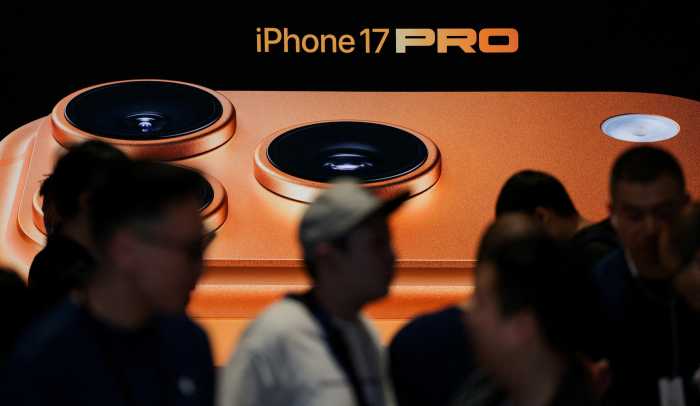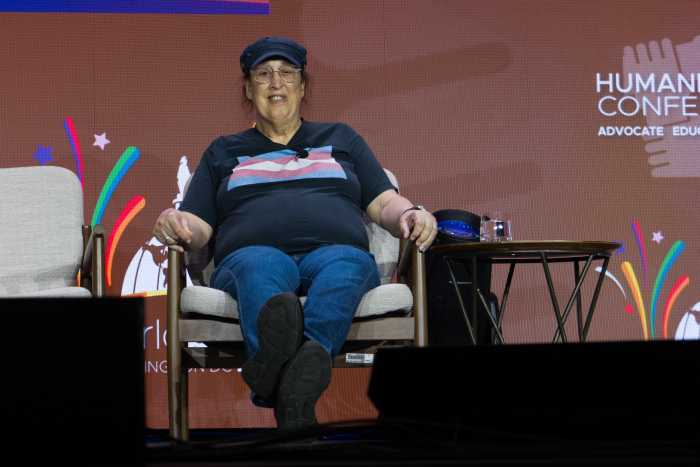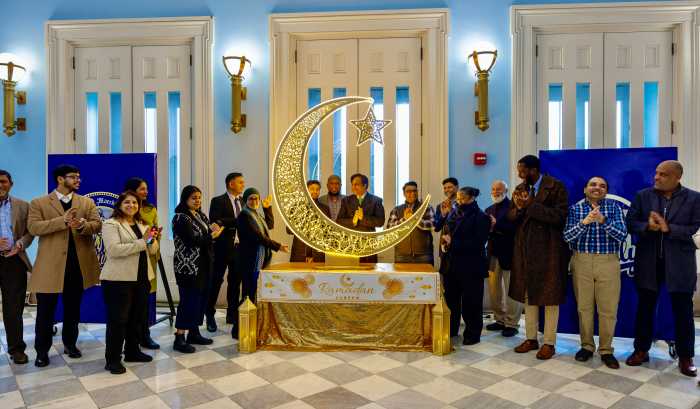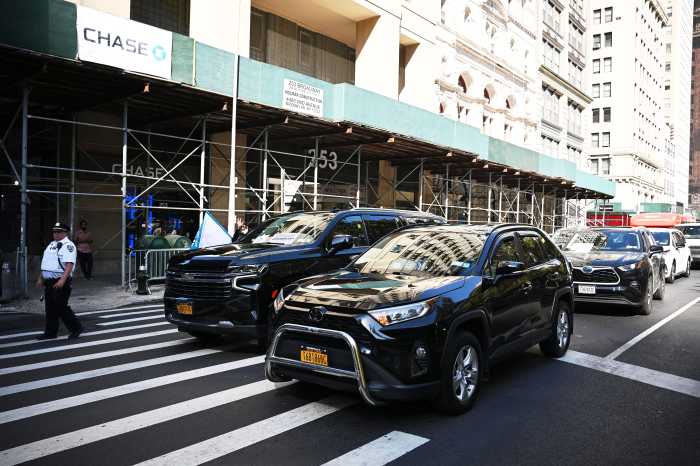Sadr City death lists, blurred to shield the names, provided by the Organization of Women's Freedom in Iraq.
BY MICHAEL T. LUONGO | Third in a Four-Part Series | Hassan mistakenly thought I had a sexual fetish about Saddam Hussein. I made an offhand comment about Iraqi policemen’s 1970s San Francisco clone moustaches — the kind sported by the dictator. Hassan held one hand up high, clenched in a tight fist, suggesting the dead ruler’s iron will, and shouted, “I find you man with a moustache, and big and hairy like Saddam, but gay, so you could have sex with him.”
I didn’t expect humor to be mixed into a mission that could be the death of us. Hassan is a point man in Baghdad for Iraqi LGBT, a London-based human rights group working with gay men in Iraq, and he, several other men, and I were heading to a safe house run by the group. They told me that as of late summer 2009, I was the only foreign journalist allowed to visit; they trusted me because I’m gay, and my dark, Mediterranean looks would allow me to travel to the house without arousing too much curiosity in the neighborhood.
Even when public spaces not lethal, freedom, privacy are relative terms
Ground rules were set for my visit. Wissam, my driver, wasn’t allowed to bring me to the house; instead, I had to meet Hassan and his friends alone, in an area of Baghdad unfamiliar to me. It took some time to convince Wissam — who was very protective of me but not fully aware of my plans — to leave me on my own on a Baghdad street. Getting out of the car, I had to look as though I were Iraqi, so I carried my notebook and camera in a plastic bag — backpacks immediately singling someone out as a foreigner.
Wissam didn’t drive away until I assured him I had spotted Hassan. He was a block away, but as I walked toward him, I froze. He was surrounded by police, but after some initial panic on my part, I got the impression he knew them. Still, the contrast between Hassan and the policemen was frighteningly apparent. The masculine, uniformed men had sun-roughened skin, bushy eyebrows, and moustaches, while Hassan was effeminate, with smooth, whitened skin, neatly plucked eyebrows, and long, oddly dark dyed hair — something no Iraqi man his age would sport — still visible even under a baseball cap. I immediately saw how intimidating a police checkpoint could be for him.
Hassan didn’t say a word, but motioned toward a small car. I hopped in and he followed, waving goodbye to the policemen on the corner. Though we were close to the safe house, he said there was no need to worry about these policemen. He had earlier told me he has bribed officers to prevent them from raiding the safe houses, and I wondered if these were among them.
At the safe house, we stepped from the car in silence, and I followed the group to a staircase leading to the top floor of a two-family home. I could see a man staring up at us, the neighbor from below. As we entered, Hassan whispered that someone had called about me, but didn’t go into any more detail. I later found out he received several calls about his meetings with me, communications he felt suggested his life could be in danger.
The living room had a couch against a wall and a glass coffee table covered with lace and pink plastic flowers. More floral knick-knacks were scattered on a glass étagère. Though the curtains were drawn, the house was surprisingly bright. An empty area, where a dining table could go, was in front of a large patio window covered by blinds, a small kitchen to the side. A doorway one step up led to a brown-tiled bathroom near the apartment’s two bedrooms. One of those rooms, stuffed with furniture, had a queen-size bed covered by a peach satin quilt, with stuffed animals scattered over the pillows. The walls were adorned with photos of one of the men I’d met in the car. I later noticed another picture of him on the living room wall and assumed it was his or his parents’ house, though the rent was paid by Hassan from Iraqi LGBT funds.
I saw nothing out of the ordinary until I entered the other bedroom, a windowless space with a pungent stale odor. The room had no furniture except for piles of foam mattresses covered with cheap acrylic velvet cloth in red floral patterns — the kind that are common in Arabic countries. Hassan told me that eight to ten men might crowd into this space at any given time. “If there is safety, we don’t care,” he said of the less than pleasant surroundings. One of several safe houses run by Iraqi LGBT, this one had opened in January of 2009, just over seven months before. If the neighbors become “nervous,” Hassan explained, they’d be forced to move.
The men staying at the house were a mixed bunch, representative of the country as a whole. One was Christian, another Shia, two were Sunni, and one a Kurd. Sami, the Christian (anyone identified by first name only in this series has been given a pseudonym, to protect their privacy and safety), spoke the most English and, along with Hassan, did most of the talking. I was fascinated, though, by Laith, a quiet, delicate young man whose photos appeared throughout the house. He had shoulder-length hair, pulled back, and piercing blue eyes from colored contacts. When he took off the white jean jacket he’d been wearing, I could see he was dressed in a tight white tank top and had small breasts, like those of a pubescent girl, poking out from his tiny frame.
Hassan told me Laith was a “ladyboy” undergoing hormone therapy. Despite the scarcities of wartime, Hassan said, hormones are readily available. Opening his shirt and exposing his own breasts, Hassan said he too was taking hormones. Suddenly, I understood his babyface and smooth skin that looks like it never needs a shave. Here within the safe house Hassan revealed to me things he and Laith hid in public out of fear for their lives.
“When we dress,” Hassan told me, “we wear a jacket, or when we go to buy something, we come back quickly because of the checkpoints.” He talked about a friend who had been killed just a few days before in the Karada district, the generally liberal neighborhood that is home to the ShiSha Café, popular among gay men. “They get him from his car, and there is another one who comes to the car and kills him,” he said. He reminded me, as well, of a video he had earlier shown me of Ahmed Sadoun Saleh, a transgender friend killed at a checkpoint, who tried to hide his physique under a jacket, his hair, like Hassan’s, tucked under a baseball cap. In the heat of the summer, such clothing stands out, making the winter an easier time for transgenders to escape detection on the streets.
Laith brought out photo albums, showing me friends who had moved to Lebanon and Syria. One wears makeup and dresses openly on the streets of Damascus. “You can wear makeup and it is okay,” he said. “No one gives them a second look. In Syria, it is normal. Here it is danger.” Two of the men in the safe house mentioned visiting Lebanon and Syria, where they have boyfriends. Syria has recently seen its own crackdown on gays, but to the Iraqi men still at home, these countries seem like open societies, reminding them of Baghdad before the war. Lebanon is in particular, they said, the gay Arab promised land.
Gay men and transgenders in a safe house paid for by the London-based Iraqi LGBT. | MICHAEL T. LUONGO
As we looked through the photos, the conversations went off chaotically in different tangents, a mix of Arabic and English. Mohammed, the Shia man, was 35 and unmarried, thin and shy, and had experienced trouble with his family. Hassan told me Mohammed had a beauty shop, with three or four gay employees, until the war. His employees were kidnapped, and his family sent him away, forcing him to study the Koran. “His family was too religious,” Hassan explained, “so he make a telephone and he come to be together with us.”
Sami, the Christian, was 28, stocky and hairy — a self-described “gay bear.” Always smiling, his English came across in a manner that reminded me of Kermit the Frog. Sami’s family blamed his being gay on the fact he was the only boy growing up with five sisters. His parents, Hassan explained, told Sami, “You want to see your life, then go,” though he has returned on and off to live with the family.
Sami told me he was almost arrested, caught in the act with a boyfriend. “I was in a bad situation in a car, and when the police came they shined the lights and caught us,” he said. “But they only arrested my boyfriend. He was Sunni, and the guards were Shia. They were from the Badr Army,” a powerful militia group that has infiltrated the police. He said that the guards told him, “You’re Christian, go, but my friend was Sunni, and one year in jail. I have seen him in jail.”
Other friends, Sami explained, have experienced worse fates. One made a date on the Manjam website and was never heard from again. Other friends who went to the ShiSha Café “were rounded up by militias, who came in to take a look.” Despite his friend’s disappearance, he said, “We are meeting on Manjam, it is safer.” Often, however, the connections remain only virtual, given the dangers of going out to meet men.
Still, Sami displayed a playful sense of humor, teaching me gay Iraqi slang, like how to describe myself as a fat, hairy gay bear.
I noticed the men in the safe house called each other “habibti,” the Arabic term for “my darling” or “my love,” but one meant for a woman. Man to man, the usual term is “habibi.” The men taught me other Arabic greetings, but I was unaware they were switching genders on me. A few days later, I tried out the phrases during a joint Iraqi-U.S. army training embed, and the puzzled Iraqi soldiers told me I was talking to them as I should to a woman.
Sami showed me pictures of a new boyfriend who was Iraqi, but so blond he looked German. He also told me he had dated an American living in Baghdad, but offered no details on how they met. As the men joked about photos Sami showed me of his boyfriends over the years, the feeling of fear in the house momentarily slipped away.
Still, the men worried about me recording our conversation and taking photos — I assured them I was not capturing their faces. They also warned of the dangers of me staying too long and having neighbors hear English. Asked what they want the West to know about gay life in Baghdad, Sami, no longer seeming carefree, said, “We want to go out of here, Europe, America. We want to go anywhere, but not Iraq, it is dangerous.” Hassan said, “Here there is always tension, always fear. Sometimes, we want to die.”
A Night on the Town in Baghdad Karada at night was full of people, a mix of locals in dishdashas and other groups of men in fashionable Western clothing. Haider, a gay man with a masculine demeanor, was taking me to meet his friends at the ShiSha Café, and we walked in the street, avoiding the crowded sidewalks so we could speak English unheard by other pedestrians.
The ShiSha Café is on the second floor of a shopping complex. The police checkpoint nearby made me apprehensive, but Haider paid it no attention, whispering simply that I must be completely silent as we climbed the metal staircase. I had agreed not to take notes or use the small camera I brought along. Haider explained it was important that people not know I was a foreigner, especially a journalist. Ordinarily, I would not publish the café’s name, but both New York magazine and USA Today have done so already.
The place is garish, full of glass, metal, vinyl, red and black tables, and environmentally-friendly corkscrew light bulbs sticking out from multi-colored ceiling fixtures. I don’t think rainbows were the intended look, but that’s what came to mind. The café was divided in half — one side dark with tightly packed tables; the other, brighter and spacious, with booths. Haider’s friends were seated before the huge plate glass windows looking out onto the street, partially obscured by advertising posters. Music videos playing on a wall-mounted flat screen TV, amplified by speakers, were so loud the window rattled in its metal frame. It was annoying, but it masked my English conversation with Haider, who reminded me not to sit like an American, with my legs crossed and the bottom of my shoe facing out. “This is not the Arabic way,” he said.
Settling in, I realized the ShiSha Café is the Iraqi pages of Manjam brought to life. I was able to see the men whose faces were usually masked in their photos. Finally, eyes were visible above their smiles and chin lines; their physiques were no longer truncated bodies.
One man in particular struck me, sitting alone at a table across from us, and I asked Haider if he knew him from the website. “I don’t know him,” he responded, adding, “Everybody here has a profile on Manjam, but they don’t always put their picture. It could have family, could be married, but still on Manjam.”
Had I seen most of these men on the street, I would not have assumed they were gay — in fact, not all were. Hassan told me that men like him — effeminate or transgender — are refused entry, part of the café’s survival strategy. Both Haider and Hassan said the Mahdi Army used to visit to scan the crowds. I told Haider what a shock the openness at the ShiSha was after having met men hiding in a safe house and others on Sadr City death lists.
Men moved from table to table, chatting with each other; a few of them knew Haider and his friends and shouted greetings. I asked Haider if there were rules about how to meet men at the café. It varies, he explained: “Maybe he is shy, and he want to meet another day… and someone, maybe if he feels naughty, maybe he goes out to table and talks with him.” Haider doesn’t like making dates with men he meets at the café. “Maybe he don’t know anything about me, because this room, it is open and we are inside,” he said. He prefers to first find someone on Manjam and then meet him in person. The ShiSha, he said, is too conspicuous a place.
Peering through the window at the Karada streets, I recalled hearing about a Sadr City café popular with gay men that was machine-gunned and firebombed. “Does this place worry about being bombed?,” I asked. Haider deadpanned, “Maybe, but every place in Baghdad can be a target, can be bombed, but people still come.” He seemed far more concerned about the drama of running into ex-boyfriends there, and called out to the waiter to take our order. The waiter was 18 or 19 and lived in Haider’s neighborhood. Though not gay himself, he knew Haider was. He brought us flavored shisha, also known as nargila, the water pipe from which the café gets its name. We ordered fruit cocktails as well; when I asked if they were alcoholic, Haider replied, “No, we are Muslim.”
Haider’s three friends didn’t speak much English, so he would occasionally break off with me to gossip with them about the men at the café, sometimes mentioning details from their Manjam profiles. The oldest and most fashionable of his friends, Ahmed, was 30, tall, and wore clingy white cotton pants and a white semi-transparent gauzy shirt, unbuttoned halfway down, that revealed a toned, neatly clipped chest. He was quite striking, with a closely cropped beard, shorn hair, a prominent nose, and wide, almond-shaped eyes that were close together under a well-tamed unibrow. Something about his face reminded me of an Assyrian sculpture, but when Haider translated my observation to him, Ahmed told me his large eyes have given him the nickname Uday, after Saddam’s murderous, sex-crazed older son, something he hates. Ahmed was self-conscious about his looks and obsessed about remaining youthful and desirable. He was married once, but is now divorced, like another man in Haider’s group.
I asked Ahmed if his clothes made him a target, and Haider responded, “He could not wear that in Sadr City, it is very dangerous.” Karada, however, is different, Haider describing it very much in terms that we might call metrosexual. “Now, we cannot decide who is gay and who is not in Karada City, and so everyone comes to Karada,” he said.
I learned that Ahmed has a boyfriend, someone closeted and much older, a member of the Iraqi military. It almost sounded as though he were kept by the older man. Haider had told me about being courted by powerful, wealthy men who offered “a car, money, anything.” He said he always refused, “because you feel like a hooker.”
Having finished our drinks and left the café, we looked for a cab to take us to Abu Nuwaz Street along the Tigris River. Haider again cautioned me, “Don’t say a thing.” But once we got into the taxi, there was a lot of giggling, and I sensed that Haider and his friends were flirting with the driver. “Wow,” Haider said in English, and then quietly told me that the driver offered his phone number to one of his friends.
At Abu Nuwaz, Haider told me that if it were not Ramadan, on “a normal day, you see parties, you see a group of people who are gay are here.” He caught himself though, admitting, “Not actually all of them are gay, but some of them, but they do parties, they sit in the grass. They do what they like.”
As Haider, Ahmed, and I walked along the pathways near the river, his two other friends, Ali and Mohammed, fell back, deeply engaged in conversation. Later, when we turned around, we didn’t see them. “They are fucking,” Ahmed said in English, and Haider shouted, “Bitches,” followed by Arabic words I didn’t understand. His outburst surprised me, but I noticed that there were fewer families around than when I was there several evenings earlier. The walkways were full of young people, some of them straight couples, others young men out alone, looking like they were cruising. Haider and I freely spoke English.
We stopped at the Baghdadi Café, a popular restaurant, and ordered kabobs. The men continued joking with each other, giggling, the words “bitch” and its Arabic equivalents falling from their mouths, along with Arabic words for gay. Then, suddenly serious, Mohammed put his kabob down and changed his tone of voice. Haider explained that Mohammed wants to travel to America as a refugee, though not because he’s gay. Mohammed’s father was a policeman murdered as a result of the war. As we talked, I realized Haider’s friends thought I was a human rights worker, not a journalist. When I told them otherwise, using my limited Arabic vocabulary, I heard a collective “ah” from the men.
Then, with a look of wonder in his eyes, Haider, considering the possibility of Mohammed traveling to the US, said, “You can do anything in America.” When I explained the difficulties I’ve heard about from Iraqis, gay and straight, who are exiled in the US, we sat quietly for a moment, and then Haider murmured something so surprising I made him repeat it. “The gay life is so beautiful,” he said. “It is so easy being in the life.”
“No one would believe that in the United States, because of what we hear,” I responded.
“No one believes that here,” he said, reminding me of just how varied life can be for gay men in Baghdad, with some finding shelter in safe houses, others seeking help at a women’s shelter, and the least fortunate targeted for death in Sadr City. As we traveled by cab back to Haider’s neighborhood to beat the midnight curfew, we were stopped briefly for interrogation at a checkpoint where bomb detectors warned of possible explosives in our taxi. After being waved along, Haider told me that the detectors, which I later learned have been found wholly ineffective at sniffing out chemical bombs, can be set off by cologne. I wondered how often militias have, in this way, identified gay men like Haider, out for an evening, one that would be their last.
Exploring Sadr City “Mr. Mike, no sunglasses and no seatbelt, you must look Iraqi,” Wissam, my driver, warned me as we prepared to head to Sadr City, the Baghdad neighborhood at the heart of the gay killings. Wissam was at first wary of the trip and thought about changing cars to avoid having his license plate recorded. He also warned me not to use my cell phone once we entered. “The signals are picked up,” he said, on walkie-talkies the Mahdi Army uses to monitor calls. If they heard me speaking English on my phone, Wissam said, they would tell each other “there’s someone foreign come to visit us.”
We agreed we would limit how much risk we took, not traveling too far in. Sadr City is divided into 79 zones. I had been told of two different locations for the bombed-out café I had heard about — one in the 20s, another in the 30s. Wissam laughed when I asked about the possibility of visiting those areas. We would visit “part 2, 3, 6, 8, 9, then we will be back,” he said, referring to areas where Shia and Sunni live together and the central government and the American forces still exerted some degree of control. Beyond that, he explained, “Jungle’s law only. When they catch Sunni, they kill him here, if he has name like Omar,” adding, there is “no music, no art here. If they see you play, they kill you.”
As we approached Sadr City, Wissam said that if we ran into trouble, “old men, we can trust, but young…. they are Mahdi Army.” After passing through a checkpoint along a canal that formed one of the sprawling district’s borders, Wissam laughed at a sign reading “Welcome to Sadr City” that bore an image of the Grand Ayatollah Muhammad al-Sadr — Mahdi Army leader Muqtada Al-Sadr’s father, who was assassinated in 1999, most likely by Saddam, making him a martyr to the Shia community. Wissam explained that we would see many guards wearing masks, perhaps because “if he has the dust, he will be thirsty” and couldn’t drink because of Ramadan. Just as likely, though, the masks were meant to conceal the identity of Mahdi Army men enforcing that militia’s authority in the area, he said.
Sadr City is dusty and low-rise like most of Baghdad, and is full of buildings largely destroyed by bomb blasts, some carried out by locals, others the work of Americans forces. Pointing at one, Wissam said, “American chopper.” There were more men in dishdashas and with beards than in any other area of Baghdad I visited, though we also saw men in Western clothing — nothing tight or fashionable, just jeans with plain or plaid shirts. Few women walked the streets, but those who did were robed in black abayas.
The district is permeated with a strong smell, like gasoline, from private electricity generators, and every so often, I saw flocks of sheep grazing on garbage that littered filthy streets. Black and green banners with gold religious writing on them are displayed everywhere, as is the visage of Muqtada Al Sadr, his fleshy, angry, bearded face crowned by a thick black turban. It’s on lampposts, stores, and mosques — an inescapable reminder of who holds the power. Any gay man with a fashionable, cultured, or overly Westernized look would be in clear danger traveling through Sadr City.
Wissam put a cigarette in his mouth, something that is technically forbidden during Ramadan, but happens anyway, even among the most religious. “I want to look like bad boys,” Wissam said to me, joking. “I’m in fashion, I am Mahdi Army.” His comment was funny, but full of disdain. A storefront sign in English reading Ahmed Hairdresser surprised Wissam so much he turned his head back around to see if it were real. “That is amazing,” he said. “They use only Arabic here.”
As we passed the Jamila Market, the traffic grew dense, slowing us down. Since so few cars in Sadr City have air-conditioning, we decided to roll our windows down; Wissam told me not to speak anymore or dare take any photos. Close to the district’s edge, the lively market was packed with people, including some in fashionable clothing. This was the only part of Sadr City where I thought I might be seeing gay men among the crowds.
By this time, it was nearly sunset, and Wissam asked me, “Shall we leave now?” We passed a large banner just before arriving at the exit checkpoint. Wissam explained that it read “We don’t like foreigners in our country.”
Entrapment and Spies Among Us “The Ministry of Interior is listening to me!” Hassan screamed to me on the phone. His voice cracked with fear and desperation, he continued, “They called me and they want to know why I am talking to you and to CNN and to USA Today.” Though he uses two different phones, that precaution apparently failed to protect him from being monitored. He told me the Ministry of Interior had asked him to come to their office to discuss what he had been telling the American media about the killings of gay men in Iraq.
I later learned that nothing came of this. Hassan did not go to the Ministry, nor was he kidnapped by its henchmen, which is one of his greatest fears. The conversation with Hassan, however, helped me better understand something I had noticed on my own cell phone. For days before his call, I thought I was crazy, certain I heard the sound of rustling papers and a woman’s voice repeating key phrases of my conversations, especially when I said the word “murder.”
It’s well known that the US Embassy has monitored journalists and others working in Baghdad. Visiting the embassy, we were required to leave our phones in their care, during which time they could do anything to them. Whenever I worried about being monitored, I hoped it was by the embassy and not by the Iraqi government.
I had also become afraid of entrapment by somebody I had for a long time thought I could trust. As with Hassan, I was first in touch with Douglass, an Iraqi, during my first visit to Iraq in 2007, but was unable to meet him because of the intense violence outside the protected Green Zone at that time. Douglass, whom I originally met on Manjam, told me he was a translator for an American security company. He used his Americanized name on the website as well as on Facebook, and my communications with him during my 2007 trip aroused no suspicions in me.
By the time of my second visit, however, Douglass’ behavior had turned bizarre. He started sending me extremely provocative sexual messages, which prompted me to remind him I was a journalist interested only in an interview. He also expressed anger that I had entered the country in Kurdistan, and he began to scrawl on my Facebook wall that he wanted to murder “Kurdish she-males.” His Facebook profile, meanwhile, was full of frank sexual descriptions that seemed more appropriate for a hustler than a contractor. Of course, he could have been both.
Before I arrived in Baghdad, Douglass texted me repeatedly, asking when I would get there. Finally, I decided to tell him my plans had changed and I would not be traveling to Baghdad. Soon, he sent more text messages, pretending to be someone else. “Help, I am poor Iraqi gay someone is trying to kill me,” he wrote in one message. Later, he wrote, “Why won’t you help me, I am a gay Iraqi being persecuted. I only want to tell you my story.” I didn’t respond to either message, and wondered how he could think I wouldn’t recognize his number.
I couldn’t remember if I had told him where I planned to stay in Baghdad, but it was the same hotel that I was in during my earlier visit when I tried to arrange a meeting with him, so I decided not to update my Facebook profile when I arrived in the capital. I thought of un-friending him, but decided instead to keep my eye on his page.
Looking through my notes since my first trip to Iraq, I realized that, making use of the same phone number and email address, he had assumed three different identities. When I carefully examined his Facebook and Manjam profiles, I concluded that despite the face being obscured, all the pictures were not of the same person. Gays in Iraq often go to great lengths to hide their identity, but there was little doubt in my mind that as an American journalist investigating the murders of gay men, I had been targeted for some sort of entrapment.
Douglass is still out there, though he has changed his name on Facebook, destroying his previous identity. And he is still on Manjam.
But Douglass was not my most unsettling encounter with monitoring in Iraq. That came on my last day in Baghdad at the Al Rasheed Hotel, a Green Zone venue that’s a favored meeting spot for Iraqis and foreigners. The lobby is a spy movie cliché — full of intriguing characters, from Iraqi sheiks to sexy local TV anchorwomen in tight skirts, US military officials, and polo and khaki-wearing fair-haired American contractors meeting local businesspeople. There are also a lot of men who sit around, seemingly with no purpose, their faces buried in newspapers.
I was interviewing a government official on a completely different topic than endangered Iraqi gays, but I noticed, the entire time, three men surrounding me, clearly watching me. Two were in suits a few seats in front of me, and another behind me in a striped shirt and jeans. They often nodded to each other.
After my interview, I went up to talk to the one who seemed to be their leader, bringing Wissam with me for translation. The man had a thick body, a dumb, thug-like face with a beaming smile, and big ears that stuck out from his head like handles. His cell phone ring tone was the theme from “The Godfather,” and he was wearing a gray sharkskin suit, just like his companion, who was handsome, though his face was blemished by a hairy dark blotch. Both men had thick, well-maintained beards, while the younger, more casually dressed third man, sitting separately, was clean shaven —and obviously nervous. Ali, the leader of the trio, explained that he and his friends were looking for jobs and hoped to meet politicians and journalists at the hotel.
Ali offered me a cigarette, but clumsily singed my eyebrow as he lit it. His soft voice suggested more gentle giant than thug. Telling him I was a journalist, I said I had no work for them, Wissam explaining I was an American freelancer. Despite the fact that I obviously relied on Wissam for translation, Ali, pointing to several stereotypical Americans in the lobby, insisted I was Lebanese, “because you are dark and have black hair.” As he continued to press his argument that I was an Arab pretending to be American, I gave him my passport. Ali flicked the pages and held it up to the light, carefully examining the photograph, trying to see if it were a forgery.
It was then that things got really odd. Ali told me he had been imprisoned in Abu Ghraib, where he was tortured — hung in the air as his tormenters inserted objects into his anus. At other times, he said, guards sat on him and committed the same offenses.
“If you look at some of the pictures, you will see me,” he insisted.
He holds no grudges against Americans, he said. “It’s the gay Iraqis,” he continued, as his face betrayed disgust. “They are the problem in this country.” The idea for homoerotic torture came not from the US and British soldiers, he said, but from gay Iraqi prison workers. “They could do what they wanted to us.”
Throughout the conversation, Ali remained friendly, and he mentioned a number of Iraqi journalists he knew, including one killed by insurgents. Wissam, who confirmed he had heard about that killing, was cautious, guiding me in some of my answers and careful to keep me from mentioning the hotel where I was staying. I was amiable toward Ali and the other men, even taking photos of them. Still, in spite of saying they were looking for work, none had any contact information to give me.
Any journalist, foreign or otherwise, working in Iraq has reason to worry about being monitored — or worse. Still, gay Iraqi friends have told me that in a country with as macho a culture as Iraq, it is completely out of character for a man to tell a complete stranger that he had been raped in prison, or to bring up the issue of homosexuality unprompted. One friend insisted the men were sent to watch me, but if that is true, I will never really know by whom.
In the final installment of this four-part series, Michael T. Luongo speaks to a gay US Embassy employee who suggests a plan to help Iraqi gays. Luongo also offers his concluding thoughts on his two trips to Iraq and issues a call to action for Westerners truly interested in changing the desperate climate facing gay and transgender Iraqis still living in a nation wracked by violence.

